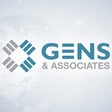Become a Creator today!Start creating today - Share your story with the world!
Start for free
00:00:00
00:00:01

AI / Automation Series #2 - AI and the amplification of Regulatory Work with François Guely
Katherine Yang-Iott sits down with François Guely, VP of Strategic Marketing at Ennov, to explore how AI solutions are transforming regulatory processes—making them faster, smarter, and more efficient. As the landscape evolves over the next few years, what should organizations anticipate? Join us as we dive into the advancements shaping the future.
François Guely is an engineer and VP of Strategic Marketing at Ennov and can be reached at fguely@ennov.com.
Transcript
Introduction to AI in Regulatory Fields
00:00:13
Speaker
Hi everyone, and welcome to the Gens and Associates podcast. I'm your host, Katherine Young Ayotte, organizational strategist, consultant, and analyst with Gens and Associates. This episode's topic is part of our AI series, where we will explore AI and the amplification of work.
Francois Gilly's Role and Background
00:00:30
Speaker
Simply put, what can those that work in regulatory do more of faster, better today that they couldn't do before because of ai My guest is someone who thinks about this for his day job and his name is Francois Gilly from Ennov.
00:00:45
Speaker
Hi Francois, thank you so much for joining me on this episode. I'm really excited to hear what you can share with us on this topic. But you know, before we get into my questions, would you mind giving a nice little self intro to our audience a little bit about yourself and the work that you do?
00:01:02
Speaker
ah Sure, Catherine. Thank you for having me on this podcast. So my name is François Gellis and I'm an engineer and also have a PhD in machine learning applied to ai systems.
00:01:13
Speaker
And I've been working with several software companies before i joined Inov and now I'm a strategic marketing director at Inov and I coordinate Inov's AI-related initiatives.
00:01:27
Speaker
especially the introduction of AI capabilities in Inoff products. and And we have been and including and NLP and Generative AI in the Inoff platform and also using these capabilities to to power several use cases ah for regulatory affairs or quality management and drug safety.
00:01:48
Speaker
And so it's an essential part of our roadmap and I'm thrilled to participate in in the podcast. Wonderful. Thank you so much. I mean, it seems like you're the perfect person to be talking about this today.
Phases of AI Development in Regulatory Work
00:01:59
Speaker
um So, you know, given the hat that you wear, all of your credentials as the engineer, having your PhD and the company that you work with, how do you see regulatory work evolving in the next two to three years as we enter this new AI era?
00:02:14
Speaker
Well, I think, yeah of course, Genitive AI is moving fast. ah but I think it will e evolve in so in several phases, and especially I see three phases of of development in in regulatory.
00:02:29
Speaker
the The first one, the first phase, is to implement use cases where users do not need to know anything about generative AI. dis canunt in this kind of use cases, the user can use the user interface,
00:02:45
Speaker
ah the The users trigger AI prompts that help them do specific tasks, but the prompts have been optimized beforehand. They are always the same prompts and the users don't see them.
00:02:57
Speaker
There are many such use cases. um These can be really real time savers and enhance productivity. and And the good thing is they can be deployed quickly ah because they do not require any training on on the part of the users and they don't really change much the current workflow that they have.
00:03:18
Speaker
So I believe this this first phase, of course, can be can be implemented quite quickly once the system has been optimized for each use case.
00:03:29
Speaker
and and i And a second phase is the implementation of chatbots ah within regulatory solutions. and And these chatbots, the interesting aspect of these chatbots is that they can access the company's data.
00:03:45
Speaker
So using this chatbot dedicated to regulatory affairs, ah users will use generative AI more creatively. and And they will be able to perform many different types of tasks.
00:04:00
Speaker
So in this phase, in order to succeed, it will be necessary to train users to write good prompts, also to manage to create and manage prompt libraries,
00:04:12
Speaker
ah that will become Gen AI best practices. So this second phase is enabled by a technology called RAG, or Retrieval Augmented Generation.
00:04:24
Speaker
So RAG is a way to make ah generative AI models aware of the company's data, even the latest data. So you can use generic models like ChatGPT or other models, ah but they are aware of your own data.
00:04:43
Speaker
So there are important benefits. For example, the possibility to automatically draft regulatory documents ah using the data that the company already has.
00:04:54
Speaker
So this phase, ah it will enable a move from a document-centric approach to more a more data-centric one. So chatbots will enable to interact with all the repository of regulatory documents and processes ah as if it was and a knowledge database.
Challenges and Changes in AI Integration
00:05:15
Speaker
So the users can ask questions, request tasks, and the AI will use the contents of the documents that are relevant and and that the processes that are relevant to produce the the desired results.
00:05:28
Speaker
So these black-based chatbots will be ah very useful. ah But I believe the next step might even have more impact.
00:05:39
Speaker
so So as I see it, I think the third phase, the the next phase ah will be the capability to create autonomous agents. So o autonomous agents are agents that can perform tasks automatman autonomously. So they can collaborate with employees or with other agents.
00:06:00
Speaker
And each agent performs a specific role or or task. So if if you think, for example, of creating regulatory documents, you could have an agent that makes a first draft of a document.
00:06:14
Speaker
You could have another agent that proofreads the document and tries to find some factual errors. And maybe another one which would try to improve the style of the document. And then another one, which would, for example, check the that the document complies with the guidelines.
00:06:33
Speaker
And there would be, for example, another one, which is orchestrating the work of these agents. So this phase of creating autonomous agents, it will require, I think, the regulatory organization to to learn how to manage these agents and how to collaborate with them. so They will not be working just together. They will also be interacting with users.
00:07:00
Speaker
So it could be, I think, the most challenging phase from the point of view of the company's organization.
Timeline and Expectations for AI in Regulation
00:07:08
Speaker
And it will probably require change management and and new competencies, et cetera.
00:07:14
Speaker
Yeah, I do want i can't sort of go into, you just said a lot of things right there. And I kind of want to go into a little bit of each of those things. I mean, I think your first point, right, phase one, this ease of entry, right, where people don't really know how to need to know how it works. They can sort of just, you know, use it as sort of like a prompt or whatever. I think that's really important just to kind of ease the behavior, right?
00:07:35
Speaker
i mean, it does feel like where, you know, my question was, you know, how you see it evolving over two or three years. And, you know, i it feels like you went from, you know, kind of something that's very sort of the basic, right, the ease of entry to something very ah complex with the, you know,
00:07:49
Speaker
with the, what do you call them, the generation? Yeah, the autonomous agents. autonomous agents. And autonomous and reto sorry retrieval augmented generation. Yes, yes. It does feel like we're sort of just in the beginning stages, right? But the possibilities are really starting to emerge. And so, you know, um like We did a recent ai Pulse study where we looked at the implementation timelines of when companies believe that these different types of advanced technologies will actually go into production within their regulatory organizations, right? So for some of the activities that you mentioned, right, such as Gen AI for document creation, um ah you know, auto-contact,
00:08:26
Speaker
AI for reg intelligence, for you know health authority question ingestion, question mining, you know all of those things. When we actually looked at the data, less than half of the 41 companies anticipate that they're going to have these things in production by the end of 2027, which is about two years from now. right If we push it out for two more years, it tells a slightly different story where a lot more companies are saying, yes, maybe in two more years after that, like in 2029, we'll have some of those.
00:08:53
Speaker
But the reason I bring this up is because you know, we did run a parallel study asking the solution providers about when they think the implementation tipping point is.
Examples of AI Applications in Regulation
00:09:01
Speaker
And, you know, based off of everything you just said and also off of our data, the prediction is much earlier, which tells me, you know, that you guys and, you know, the the providers, you know, believe that there are solutions available today to use that it can be integrated.
00:09:15
Speaker
um You know, you've you've given some of some ah sort of general use cases and examples, but, you know, I would love to hear some more specifics about you know where exactly can AI, based off of the solutions that you guys provide or know that exist today, where can it really amplify regulatory work, either by accelerating it or making it easier for those that work in this field?
00:09:37
Speaker
Oh, yes, ah absolutely. So, for example, ah we in the Enough Solution, we already... enable users in regulatory affairs to automatically create documents in the document management system ah directly from files, ah for example, PDFs or Word files.
00:10:00
Speaker
So in this case, what's happening is that ah the AI extracts the necessary metadata that are associated to the to the document and automatically fills this metadata from the document contents.
00:10:15
Speaker
So this is an example of something that is can seem quite simple, but ah that really is a time saver for for users. and And then another aspect of it is the capability also to automatically classify these documents in the ECTD structure so as to make a first draft of submissions quicker.
00:10:39
Speaker
So this is, this is one for example, one example all of of a use case in in regulatory affairs. Also, what we we see, and and something which is also quite mature right now, ah is the capability of automatically pre-filling forms from from existing data. So, for example, in pharmacovigilance cases, one really... yeah Important use case is to automatically pull data from the narrative of the case to fill automatically the form of the pharmacovigilance case.
00:11:16
Speaker
So this is also a huge typesaver in pharmacovigilance. um and And then AI can also be used, for example, to pre-assess the seriousness of the case, to facilitate the triage, et cetera.
00:11:29
Speaker
So this is also something which several... providers already have. And for another example is in literature monitoring.
00:11:43
Speaker
So scientific papers, they can be automatically screened to assess if there should be a creation of a new PV case. So what what we see is the number of published papers increases every year.
Benefits of AI in Regulatory Work
00:11:58
Speaker
And and really automating this literature monitoring is is really needed and works quite well with AI.
00:12:09
Speaker
Then, of course, yeah, sorry. Sorry, go ahead. No, I was just going to say, these are great examples because I think one of the um sort of the main characteristics um that people really sort of appreciate about AI is that, you know, right now there's like a human who's going around reading all these papers and summarizing them and communicating them all this, right? And so, you know, when you have a machine to be able to do that very quickly and at you know large volumes of it, you know it really does save that person the time to be able to then spend their time you know on sort of more creative problem solving or you know strategic type of um work related tasks.
00:12:45
Speaker
so i think um I think that's a really important um thing to call out that you know this AI as an assistant to be able to to save you time and all those time-consuming activities that you do today is really really sort of the first step where you see the impact of AI in your work, right?
00:13:02
Speaker
Yes. and um and And it's just ah also ah one of the many uses. so um what we see also, for example,
00:13:15
Speaker
ah is that automatic translation has many ah uses, many potential uses, like for example, facilitating the global laboring process by automatically generating translations and at the same time automatically ah controlling the terminology.
00:13:33
Speaker
So yeah it can enable to harmonize the wording across ah ah different markets and it's a real challenge. Yes. And AI can make this process quicker, more precise, accelerate the the whole process, which currently is not not so not too quick.
Success Factors for AI Integration
00:13:53
Speaker
Well, so, you know, like the conversation of hype versus reality always pops up when we talk about these types of things and perhaps for good reason, right? You know, sure, the possibilities of what AI could offer are fun to imagine.
00:14:07
Speaker
But given the reality of these situations, right integrating AI requires a lot of work upfront. And much of that work is you know but what I deem as organizational. right Do you have the right governance structure set up? What's the quality of your data?
00:14:21
Speaker
I mean, you talk about you know how AI can auto-populate data you know for these forms. But like if that data isn't accurate or you don't trust it, then you know that that doesn't help, right? How can you successfully optimize your processes? Do you have the people to train your AI systems, right? Something that you brought up earlier.
00:14:38
Speaker
These things are really complex and it takes a lot of time. So this kind of gets to my last question, right? What do you wish your clients would do or consider to better prepare for to ensure like a smoother integration, easier transition for the adoption of technology in their regulatory organization?
00:14:55
Speaker
i mean, you spoke a little bit about change management earlier, but, you know, any sort of other I don't know, bla bits of wisdom here. Yeah, that's that's a very important question. um I'd say first, the data are essential.
00:15:11
Speaker
ah AI needs data to be available and to be correct in order to produce good results. So I would say the current initiatives like IDMP or ECTD4 are really essential and because they will or really facilitate data the the work of of AI.
00:15:31
Speaker
um And I'd say that another thing is companies need to have faith plan. they They need to to think about initiatives that can be done quickly, ah that do not require required to train users too much, that can be easily adopted as a first step.
00:15:51
Speaker
But then they also need to plan ahead for future steps that will be more ambitious, ah like with chatbots or agents. ah that and And that will require user training, change management, et cetera.
00:16:07
Speaker
So that's another aspect of doing the planning ahead. um And I think also and there needs to be a clear human oversight and and checkpoints.
00:16:22
Speaker
It's essential to keep humans in the loop when you implement AI. to ensure the quality of the final results, but also to comply with EMA and FDA expectations.
00:16:35
Speaker
So for example, EMA, they expect a human-centric approach to AI. And also the FDA, they have ah created a credibility framework, and they expect the validation, bias testing, also explainability of the results of AI implementations.
00:16:55
Speaker
so ah So this is and ah another aspect, ah the necessity to to have a human in the loop and to and to validate the results. And also, I think it's important to train the workforce and because it's in several aspects. So, for example, prompting the best practices of models, but also the limitations of the AI models.
00:17:23
Speaker
Also knowing what are the expectations of the agencies such like the FDA or EMA about about AI. And also I think that ah companies need to consider that it's a marathon, not a sprint.
00:17:42
Speaker
ah There will be new AI cases coming progressively. ah You need to evaluate their real benefits ah and and not necessarily rushed into implementations ah and and not take the time to to validate that it really works.
00:18:01
Speaker
And also, AI models are progressing regularly, so you can expect that you will get ah better results in in the future, even if you have tried some implementation and it does not fully give the results you would expect.
00:18:19
Speaker
And also that the solution providers will include these new capabilities progressively. It's not going to be, as you said, it would take several years.
Conclusion and Future Discussions
00:18:29
Speaker
It's not going to be implemented immediately.
00:18:33
Speaker
So I believe it's important to to have a ah long-term plan to to adapt step by step. Yeah, I absolutely agree. And I think you really sort of hit on the point that it's it's this whole new sort of you know era that we're entering. It's really a work in progress, but it's also really amazing, right?
00:18:55
Speaker
That we can imagine what's next and what's possible. um And you know um you know the the people and sort of the technology are sort of evolving you almost at the same pace, right? I guess maybe the technology is evolving faster than the people, but it is about building organization momentum, really sort of you know helping sort of the human behavior to sort of match the sort of but the acceleration of like a new way of working.
00:19:19
Speaker
So Francois, thank you so much for sharing all of your wisdom, your experiences with me on this episode. um I'd love to have you back anytime. do you have any last remarks before i close this out? Well, ah ah I want to thank you for the opportunity of speaking here and I'm thrilled to see what will be implemented in the years to come.
00:19:40
Speaker
Yes, thank you so much. So listeners, if you have questions or comments about something that you've heard today, um please, you can reach out to me or you can connect with Francois as well. We'll have his information on the episode summary of the streaming application. And I'm sure he'd be happy to answer some questions should they should you have any.
00:19:56
Speaker
So next up, I'll be chatting with our good friend and frequent collaborator Priya Beschek about the new EU AI Act that went into effect this year. Francois actually mentioned a couple of these things already about you know where the EMA and the FDA are at.
00:20:11
Speaker
um But a lot of our ah colleagues, and you know they want to know if their AI compasses are pointed in the same direction as some of these health authorities, or at least in the you know the right direction, right as these new regulations and the rest of the life sciences industry. So um tune in for our next episode.
00:20:27
Speaker
Until next time, cheers.








